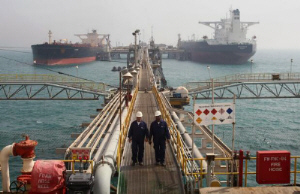Iraq began pumping oil on Sunday to the first of five floating terminals in the Gulf in a move that will increase its export capacity by 850,000 barrels per day.
 Iraq began pumping oil on Sunday to the first of five floating terminals in the Gulf in a move that will increase its export capacity by 850,000 barrels per day.
Iraq began pumping oil on Sunday to the first of five floating terminals in the Gulf in a move that will increase its export capacity by 850,000 barrels per day.
Prime Minister Nuri al-Maliki symbolically opened the valve of a pipeline that runs from Iraq's southern oil fields to the port of Faw, 535 kilometres south of Baghdad, and then on to the terminal.
Oil ministry spokesman Assem Jihad told media sources that the introduction of the terminal is part of a plan to increase Iraq's production and export capacity, and said that the second of five planned terminals will hopefully be completed this year.
The eventual goal is for Iraq to be able to export five million barrels of oil per day from the south alone, he said.
Fayyad Hassan Naima, the director general of the Southern Oil Company, stated that "the terminal will be ready for exports in a few days."
The other four floating terminals are due to be operational by the end of 2013. So far the project has cost $1.5 billion.
Iraq currently produces about 2.9 million barrels per day.
Oil sales account for the vast majority of Iraqi government income and around two thirds of gross domestic product. The country exported an average of 2.1 million bpd in 2011, according to Oil Minister Abdelkarim al-Luaybi.
Iraq plans on increasing production and exports this year to 3.4 million bpd and 2.6 million bpd respectively, Luaybi, who was present at Sunday's ceremony, said recently.
Currently about a quarter of Iraqi oil exports come from northern fields and are routed by pipeline to the Turkish Mediterranean port of Ceyhan.